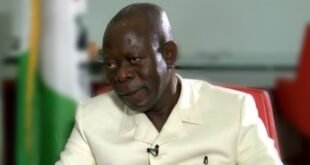The Federal High Court sitting in Lagos, in a landmark ruling, has ordered Alhaji Lai Mohammed, former Minister of Information and Culture and the ministry of information to disclose details of the agreement between the Federal Government and X, formerly Twitter.
The court said this was done to assess whether the agreement was compatible with the exercise of Nigerian citizens’ human rights online.
The ruling was delivered in May 2024 by Justice Nnamdi Okwy Dimgba following a Freedom of Information claim number: FHC/L/CS/238/2022, filed by the Socio-Economic Rights and Accountability Project (SERAP). A certified copy of the ruling was obtained last Friday.
In his ruling, Justice Dimgba held that, “The former minister and the Ministry of Information are directed and required to provide a copy of the agreement between the Nigerian Government and Twitter to SERAP solely to ascertain its impact on the protection of the fundamental human rights of Nigerians.”
Justice Dmgba stated that, “The disclosure of the details of the agreement between the Nigerian Government and Twitter is in the public interest and does not affect the business interests of Twitter as a third party. The disclosure is also not prejudicial to Nigeria’s sovereignty and national security.”
Justice Dmgba also stated that, “The agreement between the Nigerian Government and Twitter must be disclosed regardless of the harm it causes to Twitter if such disclosure is in the public interest.”
He rejected the objections raised by the minister’s attorney and supported SERAP’s argument. As a result, the court ruled in favor of SERAP over the minister.
Justice Dmgba further said, “The Minister has failed to prove that the President followed the due process in designating Twitter as a Critical National Information Infrastructure on the recommendation of the National Security Adviser and issuing an Order in the Federal Gazette to that effect.”
Justice Dimgba’s judgment, dated May 28, 2024, read in part: “I therefore hold that the disclosure of the Twitter agreement is not prejudicial to Nigeria’s sovereignty and national security or protected by the Official Secrets Act, as the minister has failed to prove.
“The first question that needs to be answered is how the need to disclose the agreement is outweighed by the importance of protecting the commercial interests of a third party, Twitter.
“The former minister strongly argued that such disclosure could harm Twitter’s business interests in other jurisdictions, particularly in Twitter’s contract negotiations.
“However, this defense is hypothetical and does not address Twitter’s specific business interests or contracts that may be affected.
“In my opinion, disclosure of the details of the agreement as requested by SERAP would not harm Twitter’s commercial interests and trade secrets or cause any financial loss, as the former minister failed to prove.
“There is no evidence presented to this Court to show that Twitter has an agreement with another country as a prerequisite to its operations in a jurisdiction that is obtainable in Nigeria.
“I am of the view that SERAP has a legitimate reason for wanting to take advantage of the agreement, namely to understand how it affects them and other Nigerians in terms of protecting the human rights of Nigerians.
“Another point of controversy is whether the need to disclose agreements in the public interest is subordinated to the need to protect national sovereignty, as the minister argued. National sovereignty, depending on the context, is synonymous with national security.
“In most cases, the need for national security takes precedence over the public interest, including the protection of fundamental human rights. However, in this case, I am of the view that the reasons for the minister’s refusal to disclose the agreement fall outside the need to protect national security and sovereignty.
READ ALSO:Lai Mohammed gets new post after serving as Minister
“The minister’s defence is based on the Cyber Crime Prohibition and Prevention Act, 2015 but fails to prove how the Act relates to the Twitter agreement other than mentioning the same.
“Beyond simply linking SERAP’s request for the agreement to ‘critical national information infrastructure’ in section 3 of the Cybercrime (Prevention and Prohibition) Act, nothing more is said about its relevance and how it supports the secrecy of Twitter’s agreement.
“Therefore, the Cybercrime Act is not applicable to this case, and the protection that should be afforded to the minister is excluded. The minister also failed to demonstrate how SERAP’s request for an agreement between the Nigerian Government and Twitter falls within the protection of the Official Secrets Act.
“SERAP’s lawsuit falls within the framework of Article 20 of the Law on Transparency of Information.”
“The Minister is directed and required to provide a copy of the requested agreement to SERAP to enable the organisation to study it and make an assessment as to whether the agreement contains the provisions of Chapter IV of the 1999 Constitution of Nigeria. [as amended] on fundamental human rights and Nigeria’s international human rights obligations.
“It is clear that Twitter was explicitly banned from operating in Nigerian cyberspace from the outset solely to protect the existence of the state-owned company. The same ban was lifted after Twitter reached an agreement with the Nigerian Government on some terms and conditions for its operation in Nigerian cyberspace and the former minister did not deny the existence of the agreement.
“SERAP’s request does not involve the disclosure of personal information but relates to agreements between governments and international companies that play in the social media and public data space.
“Based on paragraph 13 of SERAP’s affidavit of evidence, the organization requested a copy of the agreement to determine whether it complies with Nigeria’s domestic fundamental human rights law and international agreements to which the country has acceded.
“SERAP’s request seeks clarification on the scope and enforcement of the agreement to ensure that it complies with fundamental human rights law. For emphasis, the issue of human rights enforcement falls within the scope of public interest, as can be seen from a holistic understanding of Article 15(4) of the Law on Transparency of Public Information.
“Thus, public bodies can grant requests for information on the grounds of protecting human rights in Article 15 paragraph (4) of the KIP Law, as long as the interests of granting it are prioritized over the commercial interests of third parties.”
Responding to the ruling, Femi Falana, SAN said, “We commend Justice Dimgba for this important ruling. It is a legal affirmation of Nigerians’ right to freedom of expression, and access to information online. We call on the administration of President Bola Tinubu to immediately implement the ruling.”
SERAP Deputy Director Kolawole Oluwadare said: “This landmark decision is a victory for freedom of expression and online privacy, which are central to achieving individual liberty and developing democracy.
“The onus is now on President Bola Tinubu to immediately comply with the court order. We commend Justice Dimgba for his courage and wisdom. SERAP will do everything in its power to ensure the full and effective enforcement of this important judgment.”
In a letter dated July 13, 2024 sent to President Tinubu regarding the ruling, and signed by SERAP deputy director, Kolawole Oluwadare, the organization said, “We urge you to demonstrate your firm commitment to the rule of law by immediately complying with and respecting the judgment of the Court.”
SERAP’s letter reads in part: “We urge you to direct the Ministry of Information and Culture and the office of the Attorney General of the Federation to immediately disclose the details of the Twitter agreement, as ordered by the court.
“Your government’s immediate enforcement and implementation of the judgment will be a victory for the rule of law, freedom of expression including digital and data rights in Nigeria.
“SERAP trusts that you will see compliance with this ruling as a key aspect of the rule of law; an important stepping stone to building a basic institutional framework for legality and constitutionality. We therefore look forward to your positive response and action on the ruling.”
The lawsuit filed against the former minister of information and culture follows a statement by the Nigerian government on January 13, 2022 after lifting the suspension of Twitter’s operations in Nigeria, stating that, “Twitter has agreed to act with full respect for Nigerian law and national culture and history.”
The Nigerian government suspended Twitter on June 4, 2021, after it removed a post by former President Muhammadu Buhari. The former president was a co-respondent in the lawsuit, but the court granted an injunction against the minister.
Court orders ex-minister Lai Mohammed to reveal details of agreement between FG, X, formerly Twitter first appeared on Latest Nigeria News | Headlines from Ripples Nigeria.
 JamzNG Latest News, Gist, Entertainment in Nigeria
JamzNG Latest News, Gist, Entertainment in Nigeria








